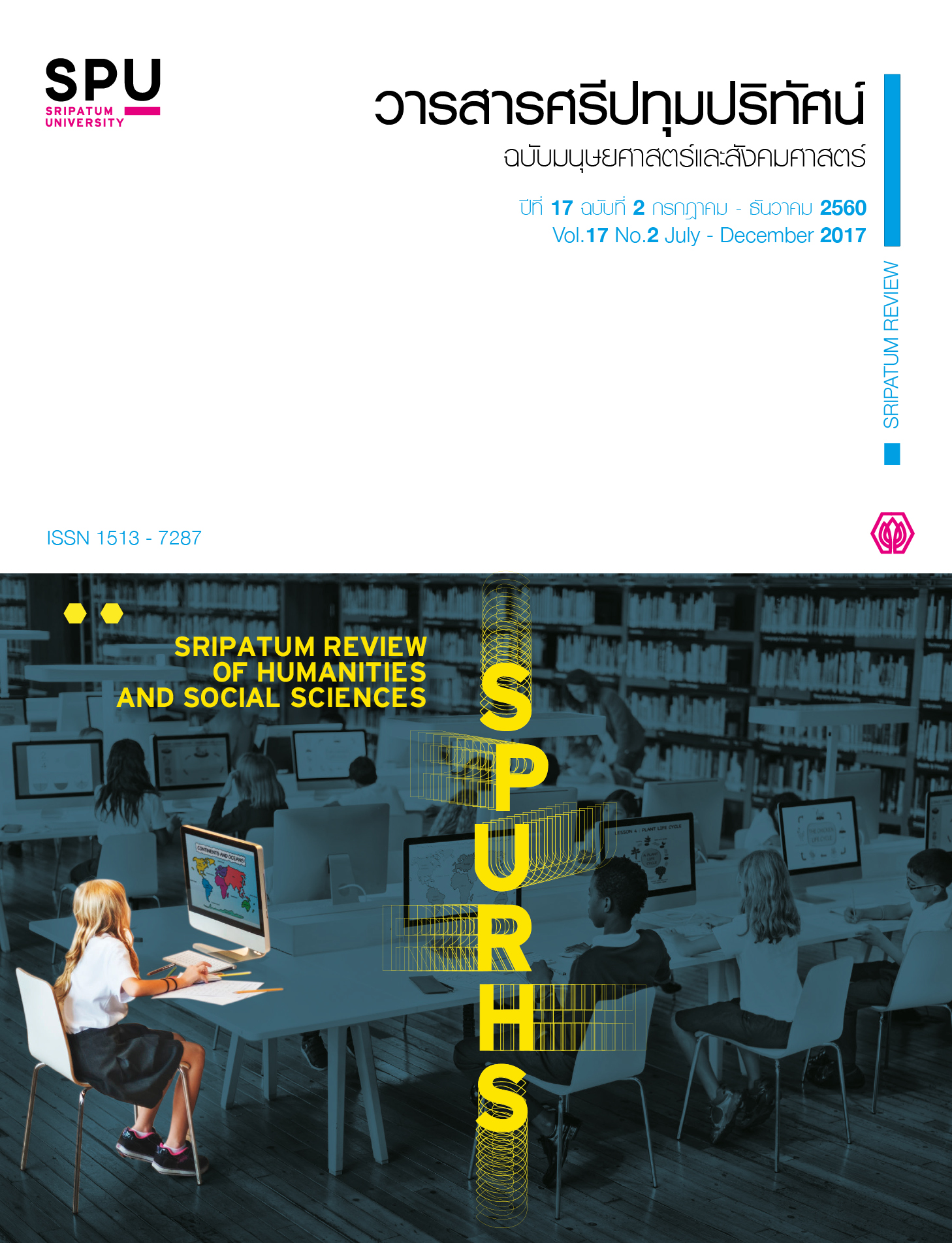Business Research Methodology Learning Strategies through Participatory Action Research
Main Article Content
Abstract
Learning strategies on business research methodology applicable for the 21st century is based on systematic approaches. The learning of business research methodology through participatory action research includes formulating questions by three systematic approaches of practice, reflection, and interpretation through mechanism of learner, educator, and methods including resource management based on learners and activities to achieve desired goals. The results are the learning of research on the actual livelihood of fishing villagers of Ban Pak Khlong Village. The learners can formulate research problems to solve their problems resulting in the benefits to the community and conduct the research until completion of the research report. The results help the learner and teacher to develop together the creativity of problem formulation, respecting villagers and industry representatives, synthesis thinking by collecting relevant literature, scrutinizing management theories to answer the research questions, establishing the holistic system, and presenting a new form of research. Furthermore, through learning and discipline processes, the research can be completed and the results can then be presented and be beneficial to the community and relevant industries. Finally, it is the learning of ethics and the pride of collaborating to contribute via research to the local development which can be used as a source for future study in the next three years. Anyway, both the learner and teacher should strictly adhere to Itthibat 4, the four basic principles for success, namely, Chanda or aspiration, Viriya or perseverance, Citta or dedication, and Vimansa or reasoning, which will enable them to work and learn happily.
Article Details
1. กองบรรณาธิการสงวนสิทธิ์ในการพิจารณาและตัดสินการตีพิมพ์บทความในวารสาร
2. บทความทุกเรื่องจะได้รับการตรวจสอบทางวิชาการโดยผู้ทรงคุณวุฒิ แต่ข้อความและเนื้อหาในบทความที่ตีพิมพ์เป็นความรับผิดชอบของผู้เขียนแต่เพียงผู้เดียว มิใช่ความคิดเห็นและความรับผิดชอบของมหาวิทยาลัยศรีปทุม
3. การคัดลอกอ้างอิงต้องดำเนินการตามการปฏิบัติในหมู่นักวิชาการโดยทั่วไป และสอดคล้องกับกฎหมายที่เกี่ยวข้อง
References
ปิยะวัติ บุญ-หลง, สุดารัตน์ คำปลิว, สุธีระ ประเสริฐสรรพ์ และคนอื่นๆ. 2558. หลักสูตร นักวิชาการเพื่อสังคม รุ่น 2 ส่วนที่ 2 การวิเคราะห์และสังเคราะห์ผลงานวิชาการเพื่อสังคม การเขียนบทความและการเผยแพร่ผลงานวิชาการเพื่อสังคมลักษณะอื่น. เอกสารประกอบคำบรรยาย สถาบันคลังสมอง. 26-30 มกราคม 2558 ณ โรงแรมปทุมวันปริ้นเซล กรุงเทพฯ.
สุชาติ ประสิทธิ์รัฐสินธุ์, 2555. ระเบียบวิธีการวิจัยทางสังคมศาสตร์. กรุงเทพฯ:สามลดา.
สุธีระ ประเสริฐสรรพ์ . 2555. โครงงานฐานวิจัย : กระบวนการเรียนรู้ใหม่ของการศึกษาไทย. กรุงเทพฯ: สำนักงานกองทุนสนับสนุนการวิจัย (สกว.).
อนุศร หงษ์ขุนทด และไพฑูรย์ ศรีฟ้า. 2558. “รูปแบบการจัดสภาพแวดล้อมการเรียนรู้แบบห้องเรียนกลับด้านสำหรับการเรียนดนตรี”. วารสารศรีปทุมปริทัศน์ ฉบับมนุษยศาสตร์และสังคมศาสตร์, 15 (2), 119-129.
เพชรรัตน์ วิริยะสืบพงศ์. 2558. โครงงานฐานวิจัย : กระบวนการเรียนรู้ใหม่ของการศึกษาไทย Research-Based Project : New Learning Process of Thai Education. . บทพินิจหนังสือ. วารสารการจัดการธุรกิจ มหาวิทยาลัยบูรพา, 4 (1), 88-89.
เพชรรัตน์ วิริยะสืบพงศ์. 2556. ปรัชญาของเศรษฐกิจพอเพียง: ความเป็นมาและความหมาย Sufficiency Economy Philosophy: Historical Background and Interpretation. บทพินิจหนังสือ. วารสารการจัดการธุรกิจ มหาวิทยาลัยบูรพา, 2 (2), 80-81.
เพชรรัตน์ วิริยะสืบพงศ์. 2559. การเขียนบทความวิจัย การวิจัยเพื่อสังคม. วารสารปัญญาภิวัฒน์, 8 (1), 263-274.
Auesriwong, A. Nilnoppakun, W. Parawech. 2015. “Integrative Participatory Community-based Ecotourism at Sangkhom District, Nong Khai Province, Thailand. Original Research Article Procedia.” Economics and Finance, 23, 778-782.
Jukka Tikkanen, Teppo Hujala, Mikko Kurttila. 2016. “Potentials of collaborative decision support methodologies to enhance reconciliation of competing forest uses—An action research on Regional Forest Programme in Finland. Original Research Article.” Land Use Policy, 55, 61-72.
K.L. Blackstock, G.J. Kelly, B.L. Horsey. 2007. “Developing and applying a framework to evaluate participatory research for sustainability.” Ecological Economics, 60 (4), 726-742.
Martin L. Katoppo, Iwan Sudradjat. 2015. “Combining Participatory Action Research (PAR) and Design Thinking (DT) as an Alternative Research Method in Architecture.” Social and Behavioral Sciences, 184, 118-125.
Morten H. Abrahamsen, Stephan C. Henneberg, Lars Huemer, Peter Naudé. 2016. “Network picturing: An action research study of strategizing in business networks.” Industrial Marketing Management, In Press, Corrected Proof, Available online 18 February 2016.

